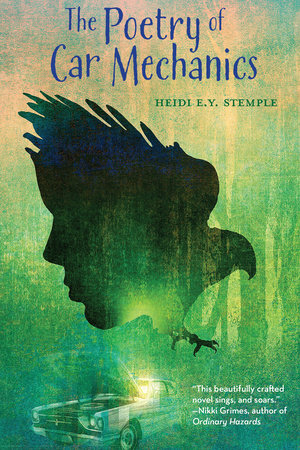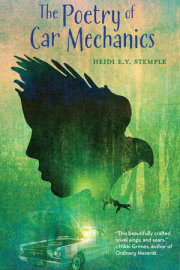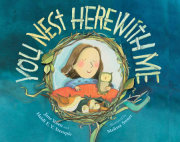PART I. DYLAN
THE POETRY OF CAR MECHANICS
There is a certain poetry
in car mechanics.
Part art,
part meter and math,
part discovery.
Lifting the hood reveals
a world I know—
not like the real world
with its
mixed messages
and verbal
land mines.
Missing pieces
and ones that don’t quite fit—
like me.
When I'm inside an engine,fie
everything makes sense.
The motor sings.
I can tune the sour notes—
fix the broken parts.
Less doctor
than partner.
I wish the world around me—
with its broken parts,
with my broken parts—
was more like a car engine.
THE PATH
Attached to our house,
like a sidecar to a chopper,
is Pops’s Auto Shop.
Behind the shop,
through a bramble of underbrush,
is a path
rambling down
to a small bend
in a small creek.
Under a red maple,
there is a low rock
where I perch
and watch a great blue heron.
He looks a bit like me—
too much leg and neck,
not enough meat around the middle.
He acts like me—
trying to blend
so as to not be noticed.
He moves through the world like me—
a solitary creature,
with no flock,
nor friend.
But he is graceful
where I am not.
I could watch him for hours.
Sometimes do.
I am patient and still.
He is patient and still,
too,
standing as I sit.
Striking only
when he is certain
his prey is assured.
BIRDS
First it was a place—
that path in the woods—
to explore
or, on bad days,
to escape.
Along the way,
along the years,
I found the birds.
No one taught me
to tell crow
from grackle,
identify
sparrow
and warbler,
buteo
and accipiter.
There are books for that.
My field guide
is old
and bears the marks
of the library—
either cast aside for a newer version
or lifted
by my mother
on a day she decided
rulesf
need not be followed.
Either way,
it is the best gift
I ever received.
This language of birds, shared
first with friends.
but remaining, still,
long after the friends
have flown.
No one told me,
perhaps no one knew,
birds
would bring me peace
and fill the missing piece
in me.
TWITCHING
British people call girls
birds.
They call birdwatching
twitching.
Every part of me
finds both these facts
appropriately
poetic.
I am awkward—
branching-owlet-attempting-his-first-flight
awkward.
Even more so
around girls.
I want,
so badly,
to talk to them.
The wanting makes the twitching
worse.
The twitching makes the wanting
worse.
I know
girls are not birds,
but poetry.
They move in metaphor
and simile,
leaving me
without words.
Alone, though,
out in the forest
behind the shop,
I feel most myself,
my unawkward self,
filled with poetic words,
and birds—
twitching.
WHAT’S IN A NAME
My mother named me Dylan
even before I was born.
Boy or girl,
I was to be named for a poet.
“It’s a boy,”
announced the nurse
as he placed me
into my mother’s arms.
“Dylan,”
she whispered my name.
“Dylan Thomas Jude.”
I dream of her sometimes.
But when I wake,
she still isn’t here.
I am like her
in the corners of my mind.
That same quiet
sadness
crouches in me.
But it’s not large
like it was in her.
I name it,
take its power.
Because I have always known
what it can become—
have seen it in her—
the welcomed turning
from sadness
to a gentle lightness,
calm and fun and easy . . .
and then
and then
unwound,
untethered, unmoored
wildness
swirling,
twisting into
dark—
dragging her away,
releasing her only
for short visits
home
until it had completely
used her up
and she could no longer
return.
COUNSELOR
Pops doesn’t talk about her—
his daughter,
my mother.
In school, I see
the counselor
who does talk about her.
I talk to the counselor
about Pops.
I do not talk to Pops
about the counselor.
If he knows
I asked for help,
he does not say.
It is probably
on his list of
unmanly things
anyway.
But poetry,
poetry is the real healer.
POPSPops is like an old car.
A classic car.
He does not have
the finesse
of a newer model.
His paint is chipped,
bumper dented,
exhaust not up to code.
He takes the curves slow
and the bumps hard.
His hood complains
loudly
when lifted
and he never stops talking about
the good old days.
"They don’t,"
he’ll tell you,
proud of his gruff,
rough edges,
"make ’em like they used to."
LONGING FOR THE GOOD OLD DAYS
In the good old days,
according to Pops,
men were men
and kids knew their place.
History—
like world wars
and pride
in the American way—
was taught
in school.
None of that
safe space
sissy
snowflake stuff.
But I am
sissy snowflake stuff.
Most days
I understand
Pops is just being Pops.
His bluster
isn’t directed at me.
But many nights
I go to bed,
wondering
if I am included in
“none of that.”
TOUGHEN ME UP
Pops tried many ways
many days
to toughen me up
with words
loud,
sharp,
cruel.
Some days
boys don’t cry
plays on repeat
inside my head,
drowning out
even poetry.
I try.
I really try.
But if I think I’m fooling anyone,
I just have to listen
to the disappointment
in his voice
or the disapproval
of my classmates
to know,
he has failed and
I am still
unmanly,
un-toughened me.
WHAT UNMANLY MEANS
I choose
to think
unmanly means
all the good things
my mother saw
in me.
Curiosity.
Gentleness.
Poetry.
But, to Pops
and in school,
I am reminded
that the unmanly
they see
is not
what I know,
or who I know
myself to be.
KIN
Kin means everything
and nothing.
It means you’re related
by blood
or love.
Kin can be a safe place
or filled with trauma
and drama
and fear.
Or all of those things
side by side,
all at once.
What if I AM just like her?
Better,
I sometimes think,
than like him.
Pops.
He keeps me safe,
makes sure I am fed.
But I can’t tell
how it is
we are kin.
Grandfather
grandson.
There’s blood between us.
Probably love.
But is there anything else?
Copyright © 2025 by Heidi E. Y. Stemple. All rights reserved. No part of this excerpt may be reproduced or reprinted without permission in writing from the publisher.





